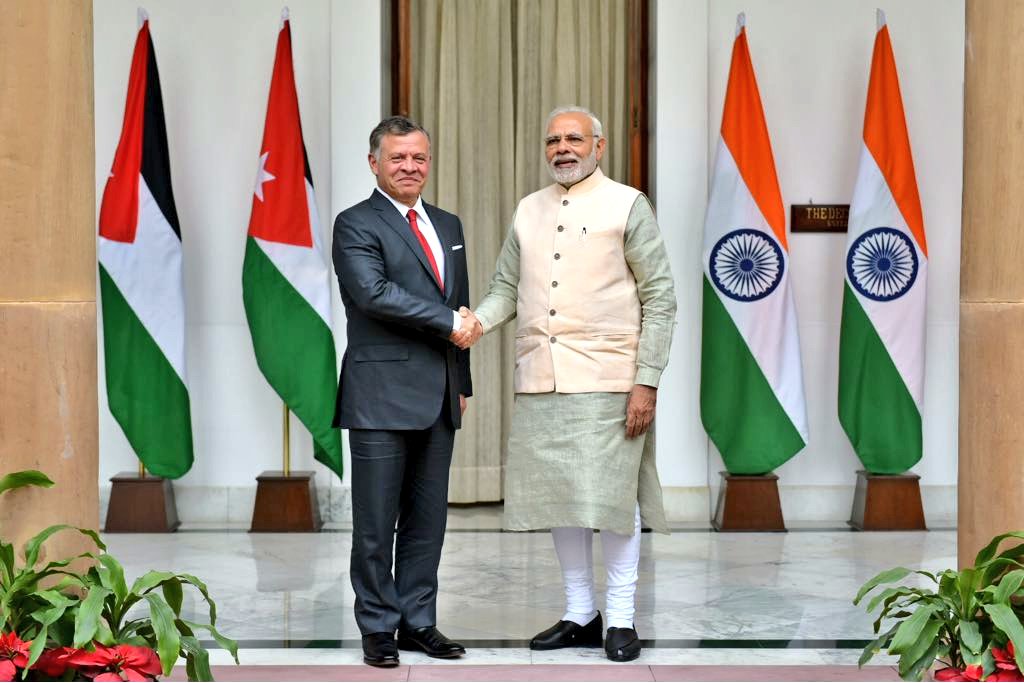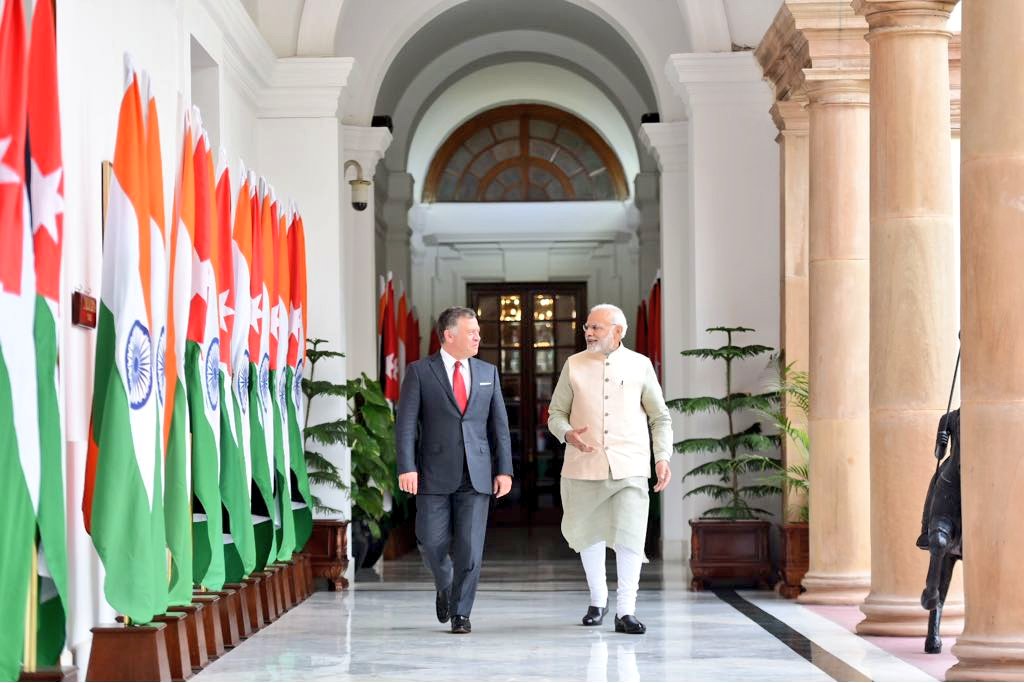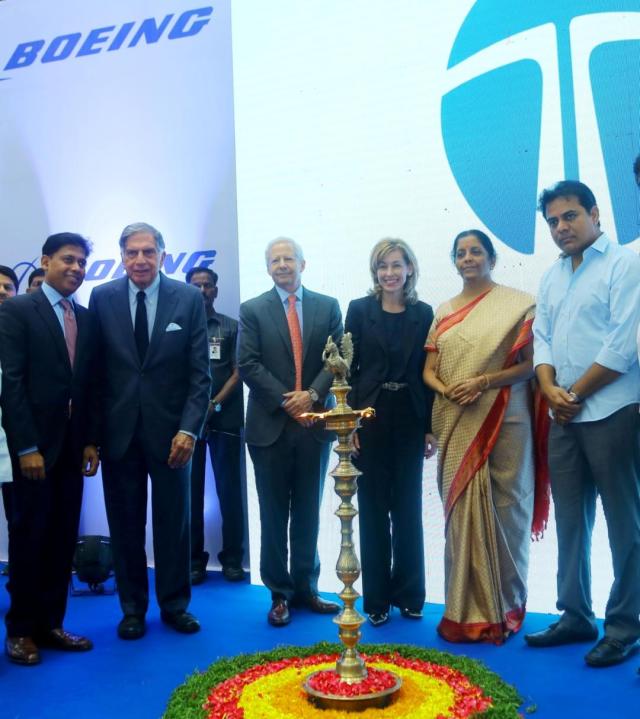PM Modi Welcomes His Majesty King Abdulla II of Jordan
PM @narendramodi warmly welcomes His Majesty @KingAbdullahII Ibn Al Hussein, King of the Hashemite Kingdom of Jordan at the Hyderabad House ahead of the bilateral talks.


PM @narendramodi warmly welcomes His Majesty @KingAbdullahII Ibn Al Hussein, King of the Hashemite Kingdom of Jordan at the Hyderabad House ahead of the bilateral talks.


Tata Boeing Aerospace inaugurates its state-of-the-art
 Apache fuselage facility
Apache fuselage facility
· Delivery of the first fuselage expected in 2018
· Partnership reaffirms commitment to ‘Make in India’
HYDERABAD/NEW DELHI, March 1, 2018 – Tata Boeing Aerospace Limited (TBAL), a joint venture between Boeing [NYSE: BA] and Tata Advanced Systems Ltd. (TASL) today inaugurated its state-of-the-art facility in Hyderabad. Spread over 14,000-square meters and employing 350 highly skilled workers, the facility will be the sole global producer of fuselages for AH-64 Apache helicopter delivered by Boeing to its global customers including the U.S. Army. The facility will also produce secondary structures and vertical spar boxes of this multi-role combat helicopter. The delivery of the first fuselage is expected in 2018.
“I congratulate Tata and Boeing for taking this bold step towards Make in India and making this substantial investment in the defence space,” said Smt. Nirmala Sitharaman, Honourable Minister of Defence, Government of India. “The manufacturing of advanced defence platforms and being integrated with the complex global supply chain will help our aerospace industry acquire technology, build local capability, provide employment and become a global exporter.”
TBAL, Boeing’s first equity joint venture in India, is the result of a 2015 partnership agreement with TASL. Construction of the manufacturing facility began in 2016 and was completed on schedule. In addition, Boeing and TASL have worked closely to develop a pool of highly skilled aerospace talent through skill development initiatives.
“TBAL is just the beginning of Boeing’s future journey of partnership with India,” said Pratyush Kumar, President, Boeing India. He further added, “As we progress, we see this as a major step towards future opportunities to pursue the co-development of integrated systems in aerospace and defence. Our partnership with Indian industry fulfils the goals of the ‘Make in India’ initiative and results in mutual growth and productivity growth for both India and Boeing.”
“Tata is a significant player in the global aerospace market focused on leveraging opportunities in global markets and reducing India’s reliance on imports in defence related requirements, 60% of which is met through imports. With the streamlining of the export regulation process under the Strategy for Defence Exports (SDE) of the Government of India, and with established capabilities and demonstrated deliveries, we are poised to emerge as a supplier of choice for global OEMs,” said Mr. Banmali Agrawala, President, Infrastructure, Defence and Aerospace, Tata Sons.
Sukaran Singh, MD and CEO, Tata Advanced Systems said, “The inauguration of the TBAL facility marks an important milestone in our collaborative engineering journey with Boeing. As India focuses on indigenous manufacturing in the defence market, this partnership is testimony to Tata Group’s commitment to develop global high-end technology in defence manufacturing, making India more self-reliant.”
TASL, the strategic Aerospace and Defence arm of the Tata Group, is a key player in the global aerospace and defence market. With established capabilities throughout the aerospace value chain from design to full aircraft assembly, it is a premier manufacturing partner for global original equipment manufacturers (OEMs) as well as the Government of India’s Defence Research and Development Organisation.
More than 2,300 Boeing-made Apache helicopters are operated by customers around the world since the aircraft entered production. The United States Army Apache fleet alone has accumulated more than 4.3 million flight hours, including more than 1.2 million in combat, as of January 2018. The helicopter has been fielded or selected for acquisition by the armed forces of 16 countries, including India.
Boeing is expanding its engagement with India’s Ministry of Defence to deliver advanced capabilities and readiness to the Indian military. The company has developed a competitive supplier base in-country that is integrated into Boeing’s global supply chain. The Indian Ministry of Defence finalised an order with Boeing for 22 AH-64E Apache helicopters in September 2015, deliveries for which are scheduled to begin in 2019.

Apache fuselage facility
· Delivery of the first fuselage expected in 2018
· Partnership reaffirms commitment to ‘Make in India’
HYDERABAD/NEW DELHI, March 1, 2018 – Tata Boeing Aerospace Limited (TBAL), a joint venture between Boeing [NYSE: BA] and Tata Advanced Systems Ltd. (TASL) today inaugurated its state-of-the-art facility in Hyderabad. Spread over 14,000-square meters and employing 350 highly skilled workers, the facility will be the sole global producer of fuselages for AH-64 Apache helicopter delivered by Boeing to its global customers including the U.S. Army. The facility will also produce secondary structures and vertical spar boxes of this multi-role combat helicopter. The delivery of the first fuselage is expected in 2018.
“I congratulate Tata and Boeing for taking this bold step towards Make in India and making this substantial investment in the defence space,” said Smt. Nirmala Sitharaman, Honourable Minister of Defence, Government of India. “The manufacturing of advanced defence platforms and being integrated with the complex global supply chain will help our aerospace industry acquire technology, build local capability, provide employment and become a global exporter.”
TBAL, Boeing’s first equity joint venture in India, is the result of a 2015 partnership agreement with TASL. Construction of the manufacturing facility began in 2016 and was completed on schedule. In addition, Boeing and TASL have worked closely to develop a pool of highly skilled aerospace talent through skill development initiatives.
“TBAL is just the beginning of Boeing’s future journey of partnership with India,” said Pratyush Kumar, President, Boeing India. He further added, “As we progress, we see this as a major step towards future opportunities to pursue the co-development of integrated systems in aerospace and defence. Our partnership with Indian industry fulfils the goals of the ‘Make in India’ initiative and results in mutual growth and productivity growth for both India and Boeing.”
“Tata is a significant player in the global aerospace market focused on leveraging opportunities in global markets and reducing India’s reliance on imports in defence related requirements, 60% of which is met through imports. With the streamlining of the export regulation process under the Strategy for Defence Exports (SDE) of the Government of India, and with established capabilities and demonstrated deliveries, we are poised to emerge as a supplier of choice for global OEMs,” said Mr. Banmali Agrawala, President, Infrastructure, Defence and Aerospace, Tata Sons.
Sukaran Singh, MD and CEO, Tata Advanced Systems said, “The inauguration of the TBAL facility marks an important milestone in our collaborative engineering journey with Boeing. As India focuses on indigenous manufacturing in the defence market, this partnership is testimony to Tata Group’s commitment to develop global high-end technology in defence manufacturing, making India more self-reliant.”
TASL, the strategic Aerospace and Defence arm of the Tata Group, is a key player in the global aerospace and defence market. With established capabilities throughout the aerospace value chain from design to full aircraft assembly, it is a premier manufacturing partner for global original equipment manufacturers (OEMs) as well as the Government of India’s Defence Research and Development Organisation.
More than 2,300 Boeing-made Apache helicopters are operated by customers around the world since the aircraft entered production. The United States Army Apache fleet alone has accumulated more than 4.3 million flight hours, including more than 1.2 million in combat, as of January 2018. The helicopter has been fielded or selected for acquisition by the armed forces of 16 countries, including India.
Boeing is expanding its engagement with India’s Ministry of Defence to deliver advanced capabilities and readiness to the Indian military. The company has developed a competitive supplier base in-country that is integrated into Boeing’s global supply chain. The Indian Ministry of Defence finalised an order with Boeing for 22 AH-64E Apache helicopters in September 2015, deliveries for which are scheduled to begin in 2019.
More Misery for Rohingyas
Half a million Rohingya refugees crammed into over 30 makeshift camps in Cox’s Bazar in southeast Bangladesh face a critical situation as the cyclone and monsoon season begins in a few weeks’ time.
The United Nations and international and local NGOs, along with the Bangladeshi government, have issued emergency calls to safeguard the population, especially those who are most vulnerable.
Already burdened with the world’s largest refugee crisis, the host country and its partners remain concerned at the slow pace of action on the ground, although preparations are already underway.
The biggest threat is the terrible conditions in the camps, most of which are frail shelters made up of bamboo sticks and plastic tarpaulins unlikely to stand up to gusting winds and heavy downpours.
In mid-January, Edouard Beigbeder, UNICEF Country Representative in Bangladesh, sent out a press statement saying, “As we get closer to the cyclone and monsoon seasons, what is already a dire humanitarian situation risks becoming a catastrophe. Hundreds of thousands of children are already living in horrific conditions, and they will face an even greater risk of disease, flooding, landslides and further displacement,”
“Unsafe water, inadequate sanitation and poor hygiene conditions can lead to cholera outbreaks and to Hepatitis E, a deadly disease for pregnant women and their babies, while standing water pools can attract malaria-carrying mosquitoes,” he added. “Keeping children safe from disease must be an absolute priority.”
Half a million Rohingya refugees crammed into over 30 makeshift camps in Cox’s Bazar in southeast Bangladesh face a critical situation as the cyclone and monsoon season begins in a few weeks’ time.
The United Nations and international and local NGOs, along with the Bangladeshi government, have issued emergency calls to safeguard the population, especially those who are most vulnerable.
Already burdened with the world’s largest refugee crisis, the host country and its partners remain concerned at the slow pace of action on the ground, although preparations are already underway.
The biggest threat is the terrible conditions in the camps, most of which are frail shelters made up of bamboo sticks and plastic tarpaulins unlikely to stand up to gusting winds and heavy downpours.
In mid-January, Edouard Beigbeder, UNICEF Country Representative in Bangladesh, sent out a press statement saying, “As we get closer to the cyclone and monsoon seasons, what is already a dire humanitarian situation risks becoming a catastrophe. Hundreds of thousands of children are already living in horrific conditions, and they will face an even greater risk of disease, flooding, landslides and further displacement,”
“Unsafe water, inadequate sanitation and poor hygiene conditions can lead to cholera outbreaks and to Hepatitis E, a deadly disease for pregnant women and their babies, while standing water pools can attract malaria-carrying mosquitoes,” he added. “Keeping children safe from disease must be an absolute priority.”
Railways No Innovation, Mismanaged, To Be BANKRUPT Soon
March01, 2018 (C) Ravinder Singh progressindia2015@gmail.com
‘Papa Fail Mat Hona’ – daughters of Ashwani Lohani said to him when he took over as Railway Board Chairman. Unfortunately Papa Had Failed Railways over 38 years. Railways Operational Performance is negative. My concerns about his Weird Ideas are –
Ø Indian Railways is lifeline of Poor – who are Totally Neglected – for Rich there are Luxury Trains, Bullet Train, Airlines, Cars & Expressways, UBER H-H Services etc.
Ø IR Fares are already Uncompetitive but for Discounts for Children and Sr Citizens. VOLVO services had increased 4 Fold in 4 yrs.
Ø In case Petroleum Products are brought under GST – price of Diesel is reduced to Rs.35-40/L – Few shall travel by Trains, National Permit Buses & Goods Transport by road to be Cheaper in most regions. >> BANKRUPT RAILWAYS.
Ø Fast Electric Vehicles Being Introduced shall DISRUPT railway operations.
Ø Railways are not INTERCONNECTED to PUBLIC TRANSPORT – Access to Railway Stations & Railway Platforms is IMPOSSIBLE by any standard.
Ø IT IS MOST WEIRD to BUILD MULTISTORY COMMERCIAL SPACES AROUND INACCESSIBLE RAILWAY STATIONS.
Ø Railways to build New Stations in Easy to Access locations, all over India.
Ø Expansion Projects are MOSTLY UNVIABLE, Bullet Train, Fitting New Toilets in Worn Out Coaches, 100% Conversion of Signal with 20 Yr Old Technology WEIRD When UBER serve over 2,00,000 Taxis in Delhi alone to around 10,000 Railway Locos.
Ø Railways is ZERO in R&D – instead of IMPROVING Locos, Buys IMPORTED High Cost Locos, Double Decker Coaches not introduced, many ore Innovations Missing.
I started writing regularly since 1980 – that year I reported CSIR-NRDC are engaged in Bogus Research, Weird Ganga-Cauvery Link, Multi-Purpose Dams, Weird Idea of Gauge Conversion and Axle Counters, Scheduling of Trains, Power, Wagon Unloading.
In 1980 I petitioned to PM about the WEIRD Idea of Gauge Conversion– I wanted Doubling of Meter Gauge lines instead – so than even Stream Engine services could operate Express Trains at over 80 kmph speed – 100kmph Shatabdis. Trains average 50-60kmph on Delhi-Jodhpur section. There are too many halts because Single Line carry traffic in both directions – Not due to commercial reasons.
1980 – IIT Delhi proposed AXLE Counter as technology to WARN AGAINST DETATCHMENT OF TRAINS Particularly Goods Trains. Within minutes Invented BETTER TECHNOLOGIES – Give Speed of Train to have passed to next train on same track.
Ravinder Singh, Inventor & Consultant, INNOVATIVE TECHNOLOGIES AND PROJECTS
March01, 2018 (C) Ravinder Singh progressindia2015@gmail.com
‘Papa Fail Mat Hona’ – daughters of Ashwani Lohani said to him when he took over as Railway Board Chairman. Unfortunately Papa Had Failed Railways over 38 years. Railways Operational Performance is negative. My concerns about his Weird Ideas are –
Ø Indian Railways is lifeline of Poor – who are Totally Neglected – for Rich there are Luxury Trains, Bullet Train, Airlines, Cars & Expressways, UBER H-H Services etc.
Ø IR Fares are already Uncompetitive but for Discounts for Children and Sr Citizens. VOLVO services had increased 4 Fold in 4 yrs.
Ø In case Petroleum Products are brought under GST – price of Diesel is reduced to Rs.35-40/L – Few shall travel by Trains, National Permit Buses & Goods Transport by road to be Cheaper in most regions. >> BANKRUPT RAILWAYS.
Ø Fast Electric Vehicles Being Introduced shall DISRUPT railway operations.
Ø Railways are not INTERCONNECTED to PUBLIC TRANSPORT – Access to Railway Stations & Railway Platforms is IMPOSSIBLE by any standard.
Ø IT IS MOST WEIRD to BUILD MULTISTORY COMMERCIAL SPACES AROUND INACCESSIBLE RAILWAY STATIONS.
Ø Railways to build New Stations in Easy to Access locations, all over India.
Ø Expansion Projects are MOSTLY UNVIABLE, Bullet Train, Fitting New Toilets in Worn Out Coaches, 100% Conversion of Signal with 20 Yr Old Technology WEIRD When UBER serve over 2,00,000 Taxis in Delhi alone to around 10,000 Railway Locos.
Ø Railways is ZERO in R&D – instead of IMPROVING Locos, Buys IMPORTED High Cost Locos, Double Decker Coaches not introduced, many ore Innovations Missing.
I started writing regularly since 1980 – that year I reported CSIR-NRDC are engaged in Bogus Research, Weird Ganga-Cauvery Link, Multi-Purpose Dams, Weird Idea of Gauge Conversion and Axle Counters, Scheduling of Trains, Power, Wagon Unloading.
In 1980 I petitioned to PM about the WEIRD Idea of Gauge Conversion– I wanted Doubling of Meter Gauge lines instead – so than even Stream Engine services could operate Express Trains at over 80 kmph speed – 100kmph Shatabdis. Trains average 50-60kmph on Delhi-Jodhpur section. There are too many halts because Single Line carry traffic in both directions – Not due to commercial reasons.
1980 – IIT Delhi proposed AXLE Counter as technology to WARN AGAINST DETATCHMENT OF TRAINS Particularly Goods Trains. Within minutes Invented BETTER TECHNOLOGIES – Give Speed of Train to have passed to next train on same track.
Ravinder Singh, Inventor & Consultant, INNOVATIVE TECHNOLOGIES AND PROJECTS
No comments:
Post a Comment